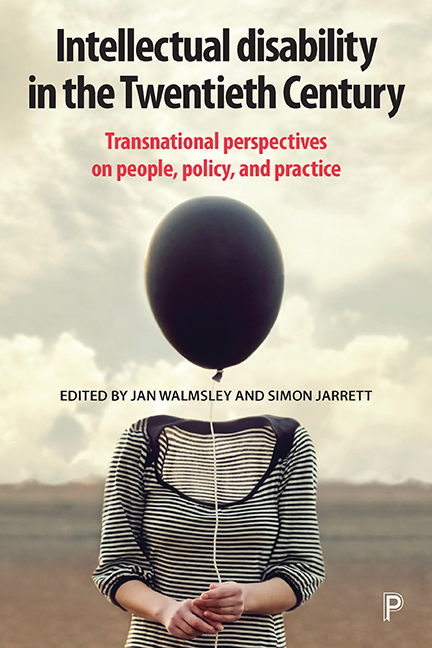 Intellectual Disability in the Twentieth Century
Intellectual Disability in the Twentieth Century Book contents
- Frontmatter
- Contents
- Notes on editors and contributors
- Introduction
- one Paradoxical lives: intellectual disability policy and practice in twentieth-century Australia
- two Tracing the historical and ideological roots of services for people with intellectual disabilities in Austria
- three Time of paradoxes: what the twentieth century was like for people with intellectual disabilities living in Czechoslovakia/Czech Republic
- four Intellectual disability in twentieth-century Ghana
- five A Greek Neverland: the history of the Leros asylums’ inmates with intellectual disability (1958–95)
- six Intellectual disability in Hong Kong: then and now
- seven People with intellectual disabilities in the European semi-periphery: the case of Hungary
- eight People with intellectual disabilities in Iceland in the twentieth century: sterilisation, social role valorisation and ‘normal life’
- nine Institutionalisation in twentieth-century New Zealand
- ten ‘My life in the institution’ and ‘My life in the community’: policies and practice in Taiwan
- eleven Intellectual disability policy and practice in twentieth-century United Kingdom
- twelve From social menace to unfulfilled promise: the evolution of policy and practice towards people with intellectual disabilities in the United States
- Index
one - Paradoxical lives: intellectual disability policy and practice in twentieth-century Australia
Published online by Cambridge University Press: 27 April 2022
- Frontmatter
- Contents
- Notes on editors and contributors
- Introduction
- one Paradoxical lives: intellectual disability policy and practice in twentieth-century Australia
- two Tracing the historical and ideological roots of services for people with intellectual disabilities in Austria
- three Time of paradoxes: what the twentieth century was like for people with intellectual disabilities living in Czechoslovakia/Czech Republic
- four Intellectual disability in twentieth-century Ghana
- five A Greek Neverland: the history of the Leros asylums’ inmates with intellectual disability (1958–95)
- six Intellectual disability in Hong Kong: then and now
- seven People with intellectual disabilities in the European semi-periphery: the case of Hungary
- eight People with intellectual disabilities in Iceland in the twentieth century: sterilisation, social role valorisation and ‘normal life’
- nine Institutionalisation in twentieth-century New Zealand
- ten ‘My life in the institution’ and ‘My life in the community’: policies and practice in Taiwan
- eleven Intellectual disability policy and practice in twentieth-century United Kingdom
- twelve From social menace to unfulfilled promise: the evolution of policy and practice towards people with intellectual disabilities in the United States
- Index
Summary
Introduction
In 1911, in a paper read at the Australasian Medical Congress, Melbourne doctor J.W.Y. Fishbourne urged Australia to implement policies to remedy ‘the problem of the feeble-minded’. In failing to act, he asserted, the nation was lagging behind international opinion: ‘The United States of America recognise the danger and England is beginning to waken up to the seriousness of the problem’. To prove his point, he cited evidence from recent British and American investigations and quoted the opinions of Dr Martin Barr, Chief Physician of the Pennsylvania School for Feeble-Minded, and Mary Dendy, English social reformer, both of whom advocated permanent segregation of those deemed feeble-minded (Fishbourne, 1913). As this example suggests, international ideas have influenced Australian thinking on intellectual disabilities. As a consequence, the broad outline of Australia's policy history follows a similar pattern to other Western countries. In the first half of the twentieth century, eugenic anxieties about the ‘menace of the feeble-minded’ dominated thinking, as they did across the Western world. Policy consequently emphasised institutional segregation. After the Second World War, new optimism about the developmental potential of people with intellectual disabilities saw the emphasis shift from institutional segregation to community integration. The shift was underpinned by the philosophy of normalisation, which dominated Australian policy from the 1970s. Combined with the desire of governments to reduce costs, it resulted in policies of deinstitutionalisation which saw institutions for people with intellectual disabilities begin to close from the early 1980s (see Earl, 2018).
In Australia, state governments were responsible for health and education services (Earl, 2018, 308). To explore the impact of policy on people in Australia, this chapter focuses on the experiences of people admitted to Kew Cottages, one of the most significant institutions for people with intellectual disabilities. Opened in 1887, the Cottages were the first major policy response of the government of Victoria to the care of children with intellectual disabilities. Modelled on English ‘idiot’ asylums, the establishment of the Kew Idiot Asylum, as the Cottages were first known, reflected the then prevailing optimism about the potential of people with intellectual disabilities (Monk and Manning, 2012).
- Type
- Chapter
- Information
- Intellectual Disability in the Twentieth CenturyTransnational Perspectives on People, Policy, and Practice, pp. 21 - 34Publisher: Bristol University PressPrint publication year: 2019
